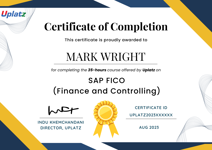
Chief Financial Officer (CFO) Premium Career Track
Program consisting of courses to help you fulfil your dream of becoming a C-Level Executive (CFO) in a top organization
Uplatz
Summary
- Uplatz Certificate of Completion - Free
Add to basket or enquire
Overview
Uplatz provides this intense Premium Career Track program on Chief Financial Officer (CFO). It is a program covering all topics related to Finance, as self-paced video lectures. The program will help you pursue a career towards becoming a CFO. You will be awarded Course Completion Certificate at the end of the course.
This Premium Career Track - Chief Financial Officer (CFO) program by Uplatz includes the following courses:
- Financial Accounting and Reporting
- Business Finance and Financial Modeling
- Costing and Cost Accounting
- International Accounting Standards (AS)
- Indian Accounting Standards (IND AS)
- Tax Deduction at Source (TDS)
- Goods and Services Tax (GST)
- Income Tax (India)
- SAP FICO (Finance and Controlling)
- SAP S/4HANA Finance (fast track)
A Chief Financial Officer (CFO) is the senior executive responsible for managing the financial actions of a company. The CFO's duties include tracking cash flow and financial planning as well as analyzing the company's financial strengths and weaknesses and proposing corrective actions.
The primary job responsibility of the Chief Financial Officer (CFO) is to optimize the financial performance of a company, including its reporting, liquidity, and return on investment.
What does a CFO do?
As we outlined above, the job of the CFO falls into three main categories, which are broken down in further detail below as we attempt to outline for you, “What does a CFO do?”. To learn more about progressions across a wide range of corporate finance careers, check out our interactive career map.
1. Reporting
Reporting takes up a lot of a CFO’s time, and this responsibility typically resides in the Controller’s group. This team of professionals prepares all of the company’s historical financial reports required for shareholders, employees, lenders, research analysts, governments, and regulatory bodies. This group is responsible for ensuring all reporting is prepared in an accurate and timely manner.
2. Liquidity
The CFO needs to ensure the company is able to meet its financial commitments and manage cash flow in the most efficient way. These responsibilities are usually carried out by the treasury group, which is often smaller than the reporting team. This group is tasked with managing the company’s cash balance and working capital, such as accounts payable, accounts receivable, and inventory. They also carry out the issuing of any debt, managing investments, and handle other liquidity-related decisions.
3. Return on Investment
The third thing a CFO does is help earn the company earn the highest possible risk-adjusted return on assets and return on capital (or return on equity). This is where the financial planning and analysis – FP&A team – comes in to help the CFO forecast future cash flow of the business and then compare actual results to what was budgeted. The FP&A team plays a critical role in analytics and decision making in the business.
If the company has a corporate development team, they also play a big part in creating (or attempting to create) optimal investment returns for the business.
Course media
Description
How to become a CFO?
Becoming a Chief Financial Officer (CFO) is a career path that typically requires a combination of education, experience, and specific skills. The journey to becoming a CFO can vary from person to person, but here are some general steps you can take to increase your chances of reaching this executive position:
Education: Obtain a Bachelor's degree in finance, accounting, economics, business administration, or a related field. Some CFOs may also hold advanced degrees such as a Master's in Business Administration (MBA) or a Certified Public Accountant (CPA) qualification.
Gain Experience: Start your career in entry-level finance or accounting positions, such as financial analyst, accountant, or auditor, to build a solid foundation of financial knowledge and skills. Progress through various roles within the finance department to gain diverse experiences.
Develop Leadership Skills: As you advance in your career, focus on developing strong leadership and management skills. Seek opportunities to lead teams and take on management roles to demonstrate your ability to oversee financial operations effectively.
Obtain Professional Certifications: Consider pursuing relevant certifications such as the Certified Management Accountant (CMA) or Chartered Financial Analyst (CFA) designation. These certifications can enhance your credibility and demonstrate your expertise in the field.
Expand Your Knowledge: Stay updated with industry trends, regulations, and best practices in finance and accounting. Attend workshops, seminars, and conferences to continually improve your knowledge and skills.
Work in Different Industries: Gain experience in different industries to broaden your understanding of various business models and challenges. CFOs with diverse industry experience are often highly sought after.
Develop Strategic Thinking: CFOs are not just number crunchers; they are strategic partners to the CEO and other executives. Focus on developing strategic thinking and business acumen to contribute to the organization's overall success.
Network: Build a strong professional network within the finance and business community. Attend industry events, join professional organizations, and seek out mentors who can offer guidance and support.
Showcase Results: Throughout your career, focus on delivering measurable results and financial achievements. Demonstrating your ability to drive financial growth and cost optimization can make you a more attractive candidate for CFO roles.
Pursue CFO Roles in Small Organizations: Consider pursuing CFO roles in smaller organizations or divisions where you can take on more responsibilities and gain broader exposure to all aspects of finance and business operations.
Demonstrate Ethical Conduct: CFOs are trusted with sensitive financial information. Demonstrating ethical conduct and integrity throughout your career is crucial to earning the trust of colleagues, stakeholders, and the board.
Continuously Learn and Adapt: The business landscape and financial regulations are constantly evolving. Aspiring CFOs should be adaptable and open to learning throughout their careers.
Remember that the path to becoming a CFO is not always linear, and there is no fixed timeline for achieving this position. It requires dedication, hard work, and a passion for finance and strategic leadership. Each individual's journey will be unique, so be proactive, seize opportunities for growth, and continue to strive for excellence in your finance career.
Who is this course for?
Everyone
Requirements
Passion and determination to make it to the top of the corporate ladder!
Career path
- Chief Financial Officer (CFO)
- Finance Director
- Finance Executive
- Chief Executive Officer (CEO)
- Chief Operating Officer (COO)
- Chief Risk Officer (CRO)
Questions and answers
Currently there are no Q&As for this course. Be the first to ask a question.
Certificates
Uplatz Certificate of Completion
Digital certificate - Included
Course Completion Certificate by Uplatz
Reviews
Currently there are no reviews for this course. Be the first to leave a review.
Legal information
This course is advertised on reed.co.uk by the Course Provider, whose terms and conditions apply. Purchases are made directly from the Course Provider, and as such, content and materials are supplied by the Course Provider directly. Reed is acting as agent and not reseller in relation to this course. Reed's only responsibility is to facilitate your payment for the course. It is your responsibility to review and agree to the Course Provider's terms and conditions and satisfy yourself as to the suitability of the course you intend to purchase. Reed will not have any responsibility for the content of the course and/or associated materials.



